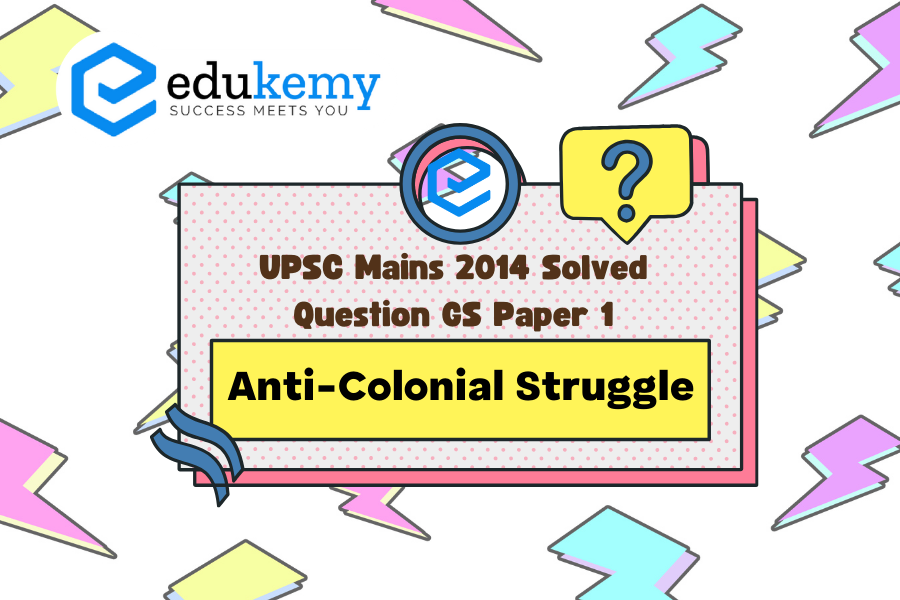The anti-colonial struggle in India was propelled by a confluence of significant political, economic, and social developments both within the country and globally. Politically, the rise of nationalist movements and the ideals of self-determination gained momentum worldwide, challenging the legitimacy of colonial rule. Economic exploitation by colonial powers, including resource extraction, forced labor, and unequal trade practices, fueled resentment among Indians and contributed to the desire for independence. Socially, the discriminatory policies of the colonial administration, such as racial segregation and denial of civil liberties, galvanized various sections of Indian society to unite against foreign domination. Additionally, the impact of World War I and II exposed the vulnerabilities of colonial powers, inspiring colonized nations like India to seek liberation and forge their destinies. These multifaceted pressures coalesced to catalyze the anti-colonial struggle in India, marking a pivotal moment in the country’s history.
Tag: The Freedom Struggle.
Contents
Decoding the Question:
- In Introduction, start your answer with mentioning multiple events that influenced Indian freedom struggle.
- In Body, discuss those events and their influence in Indian freedom struggle.
- Conclude the answer mentioning the overall significance of the struggle.
Answer:
In the 19th century global capitalism compelled India to open itself to a global system. Obviously from the end of the 19th century onwards, important political, economic and social events that occurred at the international level, left their imprint on India as well.
Multiple events which took place globally motivated anti colonial struggle in India, such as:
Political Events:
- Among political events, the defeat of Italy at the hand of Ethiopia and that of Russia at the hand of Japan proved a major game-changer as they shattered the myth of invincibility of western powers. These events encouraged political extremism in India during the early 20th century.
- Likewise the First World War, on the one hand, added further fuel to the fire of revolutionary nationalism, on the other hand, it paved the way for the Rowlatt satyagraha movement of Gandhi. Furthermore, the Second World War created a big challenge to British Rule by encouraging the Quit India Movement.
- The Second World War was one of the most important events which contributed a lot to the anti-colonial struggle in India. British made India a party of the second world war and resulted in the resignation of the Congress ministry. In 1942 the Quit India Movement was launched. The INA was formed during this time.
- Communist movements all over the world, especially the Bolshevik revolution in 1917, attracted Indian masses as it carried the message of freedom and anti-colonialism.
- Home rule movement in Ireland greatly motivated the Indian freedom struggle. Under these ideas Home Rule Movement started in India in 1916.
Economic Factor:
- At the global level, phenomena like Marxism, Leninism and World Economic Depression gave a new direction to Indian politics in the 1920s and 1930s.
- Marxism and Leninism paved the way for the rise of the leftist movement in India while World- Economic Depression made a further contribution to it as it discredited the capitalist system. Their cumulative effect was the Civil Disobedience Movement under Gandhi and so many peasant movements in the 1930s.
Social Factor:
- As a social factor the movement against racial discrimination in South Africa and the Khilafat issue of Turkey influenced the course of action in India.
- The Khilafat issue became the trigger for the first mass movement under the Indian National Congress.
This way, in almost all the phases, Indian national movement got inspiration from the political, economic and social developments held at the global level.
In case you still have your doubts, contact us on 9811333901.
For UPSC Prelims Resources, Click here
For Daily Updates and Study Material:
Join our Telegram Channel – Edukemy for IAS
- 1. Learn through Videos – here
- 2. Be Exam Ready by Practicing Daily MCQs – here
- 3. Daily Newsletter – Get all your Current Affairs Covered – here
- 4. Mains Answer Writing Practice – here


